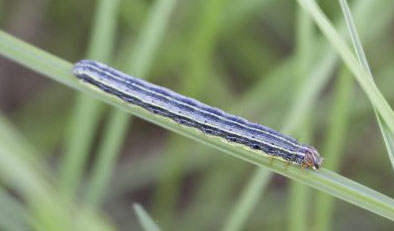Alabama Extension reminds vegetable producers to be on the lookout for silverleaf whiteflies this fall. The pests have become more common during the fall in the Southeast. An increase in activity has led to a reduction in yields for vegetable crops. These include yellow squash, zucchini, tomato, cucumber and snap beans. Costly Impact Whiteflies feed on the leaves but also …
Caterpillar Pressure Varies Across Florida
Caterpillar pressure continues to vary across Florida, according to the South Florida Pest and Disease Hotline. Respondents in the Manatee-Ruskin region reported that populations are increasing. Melonworms in cucumber and squash were reported at moderate levels. Beet armyworms, cabbage loopers and a few hornworms were reported sporadically. Caterpillars have also been very active in the North Florida region. Scouts are …
Whitefly Infestations Vary Across Florida
Whiteflies remain sporadic in areas across Florida, according to the South Florida Pest and Disease Hotline. Growers and scouts report populations are low to moderate in most areas in southwest Florida. Recent rainstorms help suppress some of those populations. Growers are also continuing to find whiteflies after heavy spray programs. Respondents indicate that whitefly infestations are widely present across central …
Arthropod Pest Management in Conventional Strawberry Production
By Sriyanka Lahiri Crop rescue through a well-planned pesticide rotation program currently remains the most effective method of pest management in conventionally grown strawberries. However, close monitoring for pests should be conducted as the first line of defense, especially since most strawberry pests are not visible through unaided vision. Thrips Flower thrips immatures and adults can feed on the fruit …
Hemp Pests: UF/IFAS Offers ID Tool
The first step in tackling a pest problem in hemp is proper identification. A new University of Florida (UF) Institute of Food and Agriculture Services (IFAS) hemp pest identification tool helps producers take the guesswork out of identifying some of those pests. The hemp pest identification guide, available for purchase through the UF/IFAS Extension Bookstore, includes 20 of the most …
Fall Armyworm Infestations: Be Sure to Scout Against Insect Pressure
High pest pressure in Alabama means vegetable and specialty crop producers needs to stay vigilant in their scouting especially as fall crops like brassicas are being planted. Fall armyworm moths continue to be very active throughout Alabama. They have almost doubled in numbers since August 2021 and are more than five times the numbers from 2020. According to the Alabama …
Whiteflies a Factor in South Florida Crops
Whiteflies are already being observed at high levels on tomatoes and watermelons in the South Florida region. According to the South Florida Pest and Disease Hotline, up to eight whitefly adults have been observed on melons in the Immokalee, Florida area. Scouts report between 15% to 60% of plants having one or multiple adults. It’s a similar scenario facing tomato …
Weed Control Essential for Container Nurseries
By Clint Thompson It is essential for container nurseries to keep plants weed free from start to finish. According to Alabama Extension, weeds can reduce the growth and marketability of nursery crops. Jeremy Pickens, Alabama Assistant Extension Professor in Horticulture at Auburn University, says when selling ornamentals, “aesthetics is everything.” “There’s really no margin for error. You’ve got to have …
Asian Citrus Psyllid Management Key for Georgia Producers
By Clint Thompson The Asian citrus psyllid (ACP) is not yet well established in Georgia. University of Georgia (UGA) assistant professor and small fruits pathologist Jonathan Oliver wants to keep that way. The psyllid vectors citrus greening disease (HLB), which has decimated Florida’s citrus production. Oliver encourages producers to scout their orchards regularly to avoid a similar fate happening in …
Sanitation Remains Key in Whitefly Control
By Clint Thompson Sanitation of vegetable crops susceptible to whiteflies remains a key management strategy for Florida producers. Hugh Smith, an associate professor of entomology and nematology at the UF/IFAS Gulf Coast Research and Education Center, encourages growers to clean up their fields properly following harvest to reduce the risk of feeding damage and potential viruses. “If you don’t make …










